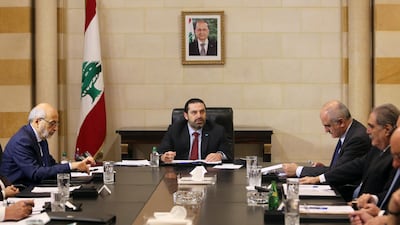The new Lebanese government has agreed to major economic reforms according to a policy statement released on Wednesday that will be put to a Cabinet vote on Thursday.
Headed by Prime Minister Saad Hariri, a committee of 10 ministers agreed that the new government’s top priority will be to implement all the economic reforms Lebanon promised at an important international donor meeting last April in Paris. These include reducing the budget deficit by one per cent every year over the next five years and privatising its state-run electricity sector.
These reforms will be “difficult and painful” but are necessary to avoid a worsening of economic, financial and social conditions, according to a draft statement seen by Reuters.
The proposed reforms are no surprise, being called for by several top Lebanese officials these past few months as government formation dragged on since the last Parliamentary elections in May 2018.
There was broad consensus regarding the statement, said Information Minister Jamil Jarrah on Wednesday afternoon after the ministerial committee’s last meeting. Only “minor amendments” were made to the previous version reviewed the day before, he said. “The entire team was keen on Lebanon and the Lebanese economy”, he added.
Lebanon received nearly $11 billion (Dh40.4 bn) in pledges at the Paris conference – also called Cedre – and hopes that private investments of £6 billion will allow it to invest $17 billion in total to revamp its infrastructures over the next eight years.
Implementing Cedre may face opposition from several parties including Hezbollah, argues political analyst Imad Salamey. “The fact that new Hezbollah minister of state for parliamentary affairs, Mahmoud Komati, indicated yesterday that they will be examining each proposition formulated at Cedre then assessing their position means there is no comprehensive agreement,” he said.
Hezbollah obtained three ministries in the new government: health, youth and sport and the ministry of state for parliamentary affairs.
An article in pro-Hezbollah newspaper Al Akhbar criticised the government’s desire to implement Cedre at all costs on Wednesday, arguing: “The government’s absolute priority, in accordance to its ministerial statement, is to implement decisions taken at Cedre… [The ministerial statement] refers more than once to the needs of the poorest while ignoring the fact that that low income and middle-income households, which pay the most taxes, will be the ones most affected by successive fiscal policies.”
An increase in government revenue would not necessarily translate into an increase in taxes though, said Mr Jarrah. “It was agreed to reduce expenses and increase revenue without increasing taxes in an effort to increase the size of the economy and reduce the deficit.”
Lebanon has the third-highest debt-to-GDP ratio in the world, behind Japan and Greece.
Key sections of the new policy statement were copied from the last government’s statement, including those defending Lebanon’s right to resist Israel and calling for the safe return of Syrian refugees. The statement also welcomed the Russian initiative to coordinate refugee return. Despite having been announced last summer, the initiative has not progressed as no one in the international community has agreed to fund it.
The ministerial statement also reiterated Lebanon’s position of keeping out of regional conflicts such as in neighbouring Syria. Though this has been Lebanon’s position since 2012, Hezbollah has sent thousands of fighters across the border to support the government of Bashar Al Assad.
Lebanon’s relationship with Syria is still fraught by the legacy of Syria’s occupation of its smaller neighbour for nearly 30 years until it was forced to withdraw in 2005.
Lebanese politics are strongly polarised between pro- and anti-Syrian factions, and a heated argument erupted during the ministerial committee's meeting on Tuesday, Minister of State for Administrative Development May Chidiac told The National.
Several ministers, including Mrs Chidiac, criticised Foreign Affairs Minister Gebran Bassil’s recent statements calling for Syria’s reintegration in the Arab League. “It’s too early for Lebanon to express itself on the topic,” said Mrs Chidiac. “Lebanon has decided to stay away from the conflict in Syria and it should stick to it”.
Mrs Chidiac is a member of the Lebanese Forces party, which is staunchly anti-Syrian.
The fact that an ally of Mr Bassil’s, Saleh Gharib, was awarded the Ministry of State for Refugee Affairs also caused debate. “He wanted to concentrate all responsibilities regarding refugee return into his ministry, but I and several other ministers opposed this. He would have overstepped on the work of other ministries, and some of the are anti-Syrian, such as the minister of Social Affairs who is also a member of the Lebanese Forces,” said Mrs Chidiac.
Should Lebanon have to one day negotiate refugee return directly with Syria, the differences of opinion within the government could make its task very difficult.


